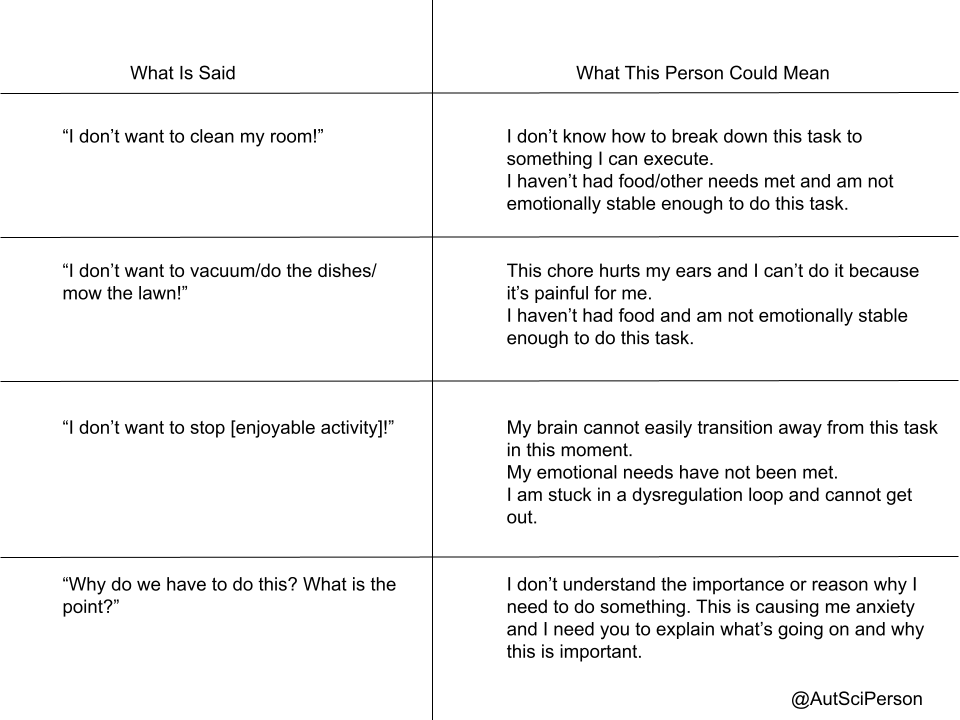
Reminder: Changing surface-level terms, using "autistic people" instead of "person with autism," doesn't make up for perpetuating myths about autistic people.
"many experience some level of difficulty with social-cognitive mentalizing, also known as 'theory of mind'" 1/13
"many experience some level of difficulty with social-cognitive mentalizing, also known as 'theory of mind'" 1/13
"..understanding the early course of social-cognitive neurodevelopment may afford the best opportunity to mitigate the profoundly negative effects that social-cognitive differences can have on some autistic people." 2/13
scientificamerican.com/article/autism…
scientificamerican.com/article/autism…
I'm also not a fan of the framing of "let's learn about autistic people so we can figure out how social attention works because they don't have it!" as if we're some fun commodities to be studied.
Not to mention that neurotypical people are crap at reading autistic people.. 3/13
Not to mention that neurotypical people are crap at reading autistic people.. 3/13
I have a question for the researchers studying infant joint attention in autistic kids and where they look -
Why are you constantly obsessing over where autistic babies look?
And did you ever think they look somewhere else because they can hear you with their ears? 4/13
Why are you constantly obsessing over where autistic babies look?
And did you ever think they look somewhere else because they can hear you with their ears? 4/13
Or maybe because they're hearing more things than other people around them and so they are looking where they hear other things?
There are so many other possibilities than "it's a deficit"! So! Many! 5/13
There are so many other possibilities than "it's a deficit"! So! Many! 5/13
I'm not done reading this article but like.. just.. no?
"Developing the ability to coordinate attention socially is important in and of itself." 6/13
"Developing the ability to coordinate attention socially is important in and of itself." 6/13
"For example, every teacher’s admonition to students to 'pay attention!' is really a request to 'pay attention to what I [the teacher] am attending to.' Joint attention is vital to social competence at all ages."
So, you're saying NTs are bad at explaining things? 7/13
So, you're saying NTs are bad at explaining things? 7/13
Another nope:
"Adolescents and adults who cannot follow, initiate or join with the rapid-fire changes of shared attention in social interactions may be impaired in their capacity for relatedness and relationships."
Relatedness to whom?! Neurotypicals only? 8/13
"Adolescents and adults who cannot follow, initiate or join with the rapid-fire changes of shared attention in social interactions may be impaired in their capacity for relatedness and relationships."
Relatedness to whom?! Neurotypicals only? 8/13
Then they go on about developing social learning and "social-cognitive mentalizing."
I just can't with this crap anymore. At least half of that article is non-autistic people's assumptions of autistic people, of infants even! NT standards are baked into it. 9/13
I just can't with this crap anymore. At least half of that article is non-autistic people's assumptions of autistic people, of infants even! NT standards are baked into it. 9/13
I think I would conclude that the non-autistic (yes I'm assuming that) people who wrote this article haven't reflected on their own social understanding or reflection of neurotypical standards, especially eye contact.
And not one mention of sensory sensitivities. 10/13
And not one mention of sensory sensitivities. 10/13
I honestly can't believe I wrote an entire thread on this because that article was a waste of my time. It regurgitated so many research concepts that are based in neurotypical norms and what is "correct" development for an autistic person. 11/13
This is a lot of what autism research is. It's not the really bad kind, but it's not anything that autistic people want research on. It's not helpful to autistic people. It's just there to consider neurotypical people's abilities to perform joint attention I guess? 12/13
To help them understand the human (i.e. neurotypical) brain and how (neurotypical) people develop socially. Look at all the things autistic people lack - this is what NTs have! They say.
I can't believe I wasted a free article on that one, really. It's just bad. 13/13
I can't believe I wasted a free article on that one, really. It's just bad. 13/13
• • •
Missing some Tweet in this thread? You can try to
force a refresh





